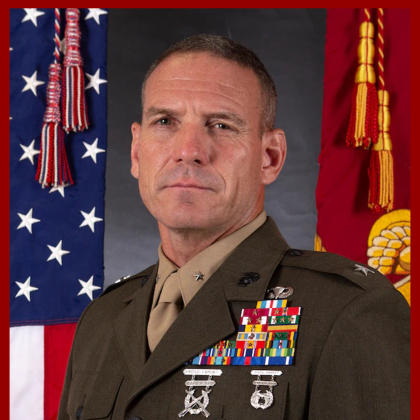The Battle With China Will Be in the Radio Waves
With 80,000 Marines and sailors deployed in the Indo-Pacific, most people look at the People’s Liberation Army of China as the most capable adversary in the region. In preparing for a potential engagement with those forces, the regional deputy commander of the Marines is looking closely at what can't be seen.
Brig. Gen. Joseph R. Clearfield USMC, deputy commander of U.S. Marine Corps Forces, Pacific, talked about data to fight and sustain actions against an enemy that constantly gains new capabilities.
“The amount of information that would pull into their combat operations, they’re pulling a lot more than the ground combat element ever has been able to move forward,” he said.
Information on the electromagnetic spectrum is plentiful, but specific packages need to move from front to rear and back, as a capable enemy acts to stop it. Still, there’s a second level of data that needs to be looked at, where industry could innovate to improve capabilities.
“Help us make sense of what we're actually seeing, then have their own solution,” Gen. Clearfield said during a keynote address during TechNet Indo-Pacific 2022.
The general spoke about the importance of knowing the difference between a signature that could potentially be a threat and another that isn’t and should be ignored, creating products that will tell the difference and convey the correct amount of information to combatants are the innovations he is looking for.
“Artificial intelligence, machine learning, if you build something that could tell Marines: ‘That’s a commercial aircraft, you don’t need to worry about it; there’s something different about that, track it, ... you should pay attention’,” Gen. Clearfield explained.
The Indo-Pacific is an area that is also home to allies, partners and friendly nations. Appropriate information sharing is vital to joint operations and for effective deterrence.

We are staying and, if anything, we are headed west
If we build a SABRE environment, they will come, says BG Joe Clearfield @USMC, Deputy Commander, U.S. Marine Forces Pacific, speaking about providing a better connection to allies and partners #AFCEATechNet
— Kimberly Underwood (@Kunderwood_SGNL) November 3, 2022
The general explained that data is shared, but not yet with the agility that would be necessary in case of a full-fledged conflict. With this in mind, an initiative hosted with the Singaporean navy set out to tackle this issue.
“Over the last decade this has started very, very small, it's been the forefront of providing what I would call actionable information,” Gen. Clearfield said.
As it develops, more partners are expected to join. “The idea is we if we build a safer environment, our partners will come,” he added.
This should be especially relevant to countries that are currently in an ambivalent position between China and the United States.



Comments